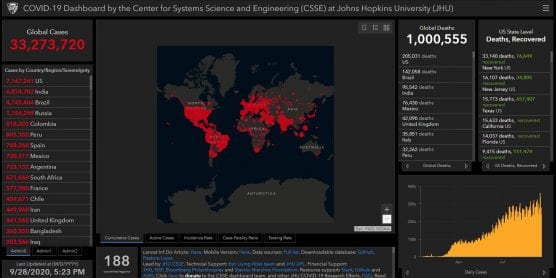The global COVID-19 death toll surpassed 1 million Monday afternoon, a grim milestone in a pandemic that caught much of the world unprepared for a health crisis and left economies reeling, convulsed politics and fundamentally altered the world.
On Monday, tallies by news organizations, including the French service AFP, and the coronavirus data tracking site Worldometer listed more than 1 million deaths linked to COVID-19, the respiratory disease caused by the coronavirus.
Data from the World Health Organization and Johns Hopkins University showed the death toll at 1,000,555 late Monday afternoon.
The grim milestone of 1 million COVID-19 deaths underscores how rapidly the virus has spread around the world through international travel.
Its global reach has been likened to the Spanish influenza outbreak in 1918-1919. Scientists believe the Spanish flu killed up to 50 million people worldwide, making it the deadliest pandemic in the 20th century.
After that, the world was struck with two other major flu pandemics — one in the late 1950s and other in the late 1960s.
Those pandemics are known respectively as the Asian flu and Hong Kong flu outbreaks and combined are estimated to have killed more than 2 million people.
At a news briefing on Monday, the World Health Organization, a United Nations agency leading efforts to combat the pandemic, chose not to mention the grim milestone of 1 million COVID-19 deaths.
When asked by a journalist whether the number of deaths may be inflated due to reporting flaws, a top WHO official dismissed that possibility.
“I can assure you that the current numbers are likely an underestimate of the true toll of COVID rather than anything else,” said Dr. Mike Ryan, the WHO head of emergencies. “Just to reassure you, there are not people who are suffering from accidents who have been counted as COVID cases. There are lots of different stories out there about things like that.”
Last week, Ryan warned that the world may see another million people die unless it works to suppress the virus through a comprehensive set of measures, such as testing, quarantines, targeted lockdowns, hand washing, physical distancing and mask-wearing.
On Monday, the WHO announced that 120 million rapid tests will be distributed to low- and middle-income countries around the world. These rapid tests can tell if someone is infected with the virus in between 15 and 30 minutes.
Tedros Adhanom Ghebreyesus, the WHO director-general, said getting rapid tests into poorer parts of the world will be especially helpful for medical workers in remote places where the virus is spreading rapidly. The WHO said the tests will not cost more than $5.
The distribution of the rapid antigen tests comes through a WHO initiative to bring countries and wealthy donors together to share the costs of distributing tests, equipment, therapeutics and vaccines to all parts of the world. Tedros said the Bill and Melinda Gates Foundation, a philanthropy set up by Microsoft co-founder Bill Gates, was involved in distributing the 120 million rapid tests.
“If we act together, we will win together,” Tedros said.
Last week, the WHO gave emergency approval for a rapid test developed by the South Korean company SD BioSensor. The agency is also set to approve another test developed by the U.S. company Abbott.
The WHO says the tests are particularly good at detecting people who are carrying a high viral load of the virus, such as those who might be found in places where the virus is spreading rapidly. Testing is very common in richer countries but rarer in many poorer countries.
— By Cain Burdeau, CNS
Like this:
Like Loading...
Related





 Tweet This
Tweet This Facebook
Facebook Digg This
Digg This Bookmark
Bookmark Stumble
Stumble RSS
RSS


























REAL NAMES ONLY: All posters must use their real individual or business name. This applies equally to Twitter account holders who use a nickname.
0 Comments
You can be the first one to leave a comment.